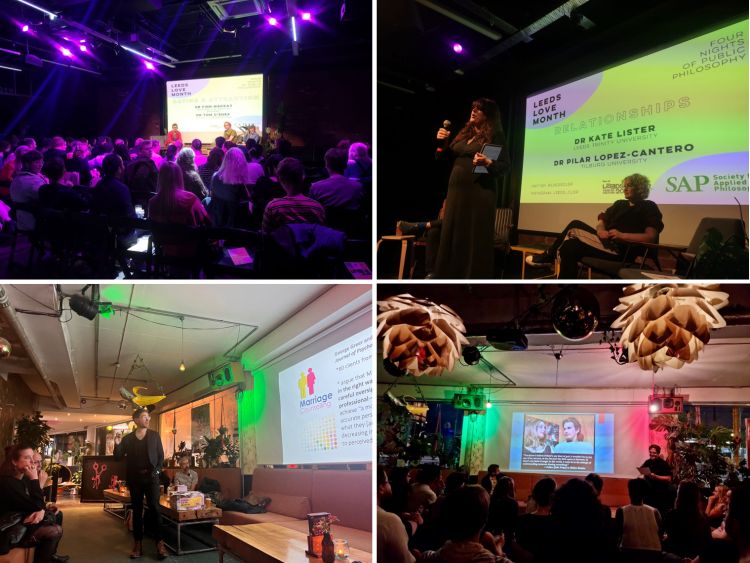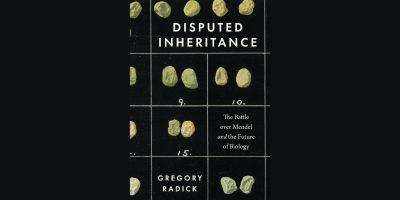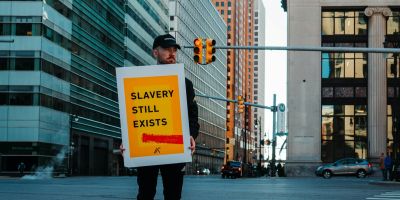Impact testimonials from the Leeds Love Month 2023

Attendees of the Leeds Love Month event series share their experiences and knowledge gained from the events, including how these would be applied in their everyday lives and relationships.
Throughout October 2023, the Centre for Love, Sex and Relationships organised a well-attended series of talks around the theme of ‘love’.
The events were held at Sheaf Street and Outlaws Yacht Club in Leeds and were attended by a mix of members of the public, students and staff from the University of Leeds and other local universities (for example Sheffield).
This piece documents the events’ successes and impacts, drawing partly on responses of attendees to a survey and comments from the organisers.
Leeds Love Month overview
This series of events, under the flagship “Leeds Love Month”, were in the words of one of the organisers, Sophie Goddard, "a series of four evenings exploring aspects of romantic life.”
It “aimed at giving people a space to engage with philosophical thoughts relating to topics around love and relationships in a friendly and convivial atmosphere,” said Natasha McKeever, another of the organisers.
Aside from achieving this, the series was an opportunity for public engagement and the establishment of some pathways to future impact. Two other organisers of the events are Luke Brunning and Ruby Hornsby.
Each of the four events was full. Sheaf Street seated 120 people and Outlaws seated 60 people. The first event was on ‘Dating and Attraction,’ with speakers Finn Mackay and Tom O’Shea. The second was on ‘Love’ with MM McCabe and Troy Jollimore. The third was ‘Relationships’ with Pilar Lopez-Cantero and Kate Lister and the final event was on ‘The Future of Love’ with Brian Earp and Robbie Arrell.
The events were funded by the Society for Applied Philosophy and the Building Impact Momentum Fund.
After the events, attendees were encouraged to give feedback through a survey. We relive some of the offerings of these events through some of the survey responses, which are anonymously cited in this article.
Motivations for attending
Attendees saw these events as opportunities to explore new ideas and an interesting set of issues at the heart of love and relationships.
While for one attendee, the “love of philosophy and special interest in inclusive sex education” was a motivation, for another it is the non-academic, safe and inclusive place to discuss the topics. Others have a scholarly interest in the subjects and appreciate research-led conversations.
In retrospect, one attendee acknowledges the new learnings and improved understanding offered through the debates. This is partly captured in their feedback that said “they were a great introduction to topics that I have not previously encountered in formal education and were a great way to meet people with similar interests.”
Engagement and (potential) impact evidence
Participants were invited to share the insights about love and relationships that they had gained from the events.
The impacts of the even series cut across various aspects. It created awareness, impacted people’s attitudes and influenced their love lives and relationships.
The events brought issues regarding justice in relationships to the fore, as an attendee reports: “justice issues within relationships was not something I thought much about before beyond more general social structures. I now have a more in-depth understanding of these issues even in relationship kinds that I am unfamiliar with.”
Another says they can better recognise the injustice of undesirability.
Attendees report greater flexibility and understanding of dating app biases and the algorithms that perpetuate them, including how engrossed gender dimensions are.
Many people learnt about monogamy, from its history to its many interpretations. One attendee said they learnt about “the history of monogamy, monogamy in different animals and the concept of social monogamy.”
For another, it is “about social/anthropological approaches to monogamy and the new insights provided into processing the breakdown of romantic relationships.”
In addition to the above, attendees mention learning about the relationship between sexuality and gender and getting an increased understanding of biological versus social theories of love.
Applying the new knowledge gained
Attendees have continued to exchange ideas and discuss issues from the events with their partners in a more open manner than before.
The following feedback are examples of ways in which attendees think they might apply the knowledge gained:
- ability to think analytically about other issues, such as the impact that autism might have on power dynamics within a relationship
- uncovering biases when it comes to dating and undermining master narratives (and creating new narratives) of what a successful relationship looks like
- going into relationships with fewer preconceptions and being more intentional in shaping interpersonal dynamics that work for me/us.
Natasha McKeever said the events “have brought to the fore issues around gender, responsibility for attraction, what it means to love someone, whether we ought to be monogamous, whether we should use love drugs and what issues teledildonics might bring in the future.”
Through the diverse topics covered, the events helped people to understand love, relationships and sex better than they did before.
They offered the attendees alternative viewpoints and laid foundations for future appreciation of opinions that challenge the popular in regards to love, sex and relationships.
Future editions of these events will provide the opportunity to gather evidence about how people have further practically applied the knowledge gained and the consequent results seen.
You are invited to follow the Centre for Love, Sex and Relationships on X @LEEDSCLSR for updates on their activities and planned events.
Suggested readings
Can Monogamy Work? By Luke Brunning
Love’s Vision by Troy Jollimore
Female Masculinities and the Gender Wars by Finn Mackay
A Curious History of Sex by Kate Lister
Love is the Drug by Brian Earp and Julian Savulescu




